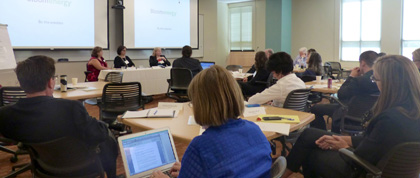
How do business ethics in Silicon Valley appear to a relative newcomer as opposed to someone who has spent her career here?
At the Business and Organizational Ethics Partnership at Santa Clara University's Markkula Center for Applied Ethics, Susan Brennan, chief operations officer with Bloom Energy Corp., discussed this with Sheila Ennis, senior vice president for in the software practice at ICR, a leading strategic communications firm. Brennan has more than 25 years of manufacturing experience and spent most of her career outside of Silicon Valley. Ennis has over two decades of experience as a senior-level technology analyst and investment banker. The panel was called "Unique pressures on business ethics in Silicon Valley."
Brennan talked about how the culture of a workplace is critical. For example, when she was managing automobile production, a mistake made by an employee could later prove problematic for a customer. It was crucial, if an employee made a mistake, for that employee to feel comfortable telling a supervisor so they could hold the vehicles that had gotten the wrong part, for example, rather than releasing them. "If you can't respond immediately, you're in serious trouble," Brennan said.
In response to a question about how, exactly, to create a culture in which the employee will immediately report a mistake, Brennan said that in manufacturing, "whether you're making toasters or cars, you measure everything." This can create a "perverse incentive" to hide errors, which makes it critical to consider how to respond to mistakes.
"If you don't handle that well, the whole people chain falls apart," Brennan said. For example, she made sure that "someone didn't get terminated for being honest about a mistake."
Brennan also said she created an "informal metric" by noting how often employees would come and tell her either good news or bad. Bad news in particular is a good metric, she said: "The true test of whether your metrics are working is the speed with which you find out that something's wrong," Brennan said.
Metrics do have pitfalls, though. For example, what happens when metrics conflict? If one team is charged finds a way to save $2 per item being manufactured but it will add 50 cents in labor costs, the idea may be vetoed by a team that is being measured purely on meeting labor cost goals.
Much of the discussion centered on whether innovation and technology are outpacing regulation.
Automotive manufacturers aren't the only ones navigating areas in which technology is moving faster than regulation. Ennis noted that "the regulations used by the SEC to manage responsible financial reporting behavior are antiquated, so the drive to achieve credibility has to come from inside companies. Particularly where valuations are high like they are for software companies in the valley, the expectations are extremely high."
Brennan said there is always a balance to strike between fast-paced innovation and following a process. "You have to have both," Brennan said. Getting a new feature to market quickly is important, but that feature also has to be tested. "I don't want to kill innovation in the teams I'm working with, but I don't ever want the customer to be validating our product."
There is a "huge tension between the need for safety and innovation," Ennis said. Companies would like to be conservative but capital is required to drive innovation and the mandate to secure it with as little dilution as possible drives companies to set high expectations." But the pace of information flow on Wall Street has increased as well. "The instant access to information provided by the Internet is both good and bad. It levels the playing field for investors, but leaves little room for companies to explain the context of changes in their outlook."
Consequently, regulations intended to ensure a level playing field for investors have caused companies to clam up, Ennis said. "Communications with the Street have become like a deposition."
Ennis said she thought Silicon Valley companies were balancing long- and short-term rewards better than they have in the past. "For a period of time after the dot.com bust, there were a lot of Silicon Valley companies that were really structuring themselves from the start with a specific acquirer in mind, but that almost never works," Ennis said. Today, lock-up periods for management to profit from stock options are longer than in the past. "These days there's more of a balance. You want management to have skin in the game but you also want a culture that values the long-term perspective."
What ethical problems are on the horizon for Silicon Valley? Ennis said big data poses a lot of risk. "Software companies are collecting a data asset that they will monetize over the next five years. The imperative to monetize that data is already in the valuations, so the pressure to deliver is immense. How people go about doing it without going afoul of privacy expectations will be interesting to see."
Margaret Steen is a freelance author.
